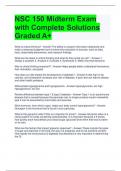NSC 150 Midterm Exam
with Complete Solutions
Graded A+
What is critical thinking? - Answer-The ability to analyze information objectively and
make a reasoned judgement and involves the evaluation of sources, such as data,
facts, observable phenomena, and research findings.
What are the steps in critical thinking and what do they entail you do? - Answer-1.
Design a question 2. Analyze 3. Evaluate 4. Synthesize 5. Make informed decisions
Why is critical thinking important? - Answer-Helps people better understand themselves,
their motivation, and goals.
How does our diet impact the development of diabetes? - Answer-A diet high in fat,
calories, and cholesterol increases your risk of diabetes. A poor diet can lead to obesity
and other health problems.
Differentiate hyperglycemia and hypoglycemia - Answer-Hyperglycemia= too high
Hypoglycemia= too low
Review difference between type 1 & type 2 diabetes - Answer-Type 1 is an autoimmune
disease that is caused because the pancreas can no longer produce insulin meanwhile
type 2 can be prevented by food intake and exercise.
What hormone, from which organ, helps your body control hyperglycemia? - Answer-
Glucagon is the hormone that is found in your pancreas
What is the glycemic index? Why is it important to know? - Answer-Glycemic index is a
rating system for foods containing carbohydrates. It Is important because it It shows
how quickly each food affects your blood sugar (glucose) level when that food is eaten
on its own.
What are the factors that impact glycemic response? - Answer-These include the types
of sugar and starches in the food, the way it is prepared, and it's fat and fibre content.
How rapidly the food product is digested and absorbed is very important in determining
the Gl.
, Which types of foods should you choose? - Answer-High fiber breakfast cereals, whole
grain, vegetables, less refined sugars.
What are the different types of fibers? What are their individual health benefits -
Answer-Foods with soluble fiber include oatmeal, nuts, beans, lentils, apples and
blueberries. Insoluble fiber, which does not dissolve in water, can help food move
through your digestive system, promoting regularity and helping prevent constipation.
What is the difference between refined and unrefined grains - Answer-Unrefined whole
grains - whole wheat or multigrain bread, brown rice, barley, quinoa, bran cereal,
oatmeal while refined grain" is the term used to refer to grains that are not whole,
because they are missing one or more of their three key parts.
What is celiac disease and its health impacts? - Answer-Celiac disease, sometimes
called celiac sprue or gluten-sensitive enteropathy, is an immune reaction to eating
gluten, a protein found in wheat, barley and rye and it damages the villi, leaving your
body unable to absorb nutrients necessary for health and growth.
What is lactose intolerance and its health impacts? - Answer-People with Lactose
intolerance are unable to fully digest the sugar (lactose) in milk. As a result, they have
diarrhea, gas and bloating after eating or drinking dairy products.
What are the dimensions of wellness? - Answer-Emotional, Environmental, Intellectual,
Physical, Occupational, Financial, Social, & Spiritual
Know the different types of activities on campus and off that you would do for each of
the dimensions of wellness. - Answer-Emotional: Therapy, Environmental: Join clubs,
Intellectual: Class, Physical: Exercise, Occupational: work study, Financial: Counselor,
Social: Join clubs, Spiritual: Bible study
What are the benefits of a healthy lifestyle? - Answer-Lower risk of disease and illness,
quality of life, treatment of current disease
What is a SMART goal and how to write one? - Answer-S-pecific, M-easurable, A-
ttainable, R-ealistic, T-imely
What are common mistakes when making goals? - Answer-Creating unrealistic goals,
focusing on too few areas, not appreciating failure.
What are the 6 stages of the Transtheoretical Model of Behavior of Change? - Answer-
Pre-contemplation, Contemplation, Preparation, Action, Maintenance, Termination
What are the different factors affecting each stage? - Answer-Personal factors,
predisposing factors, Enabling factors, reinforcing factors




